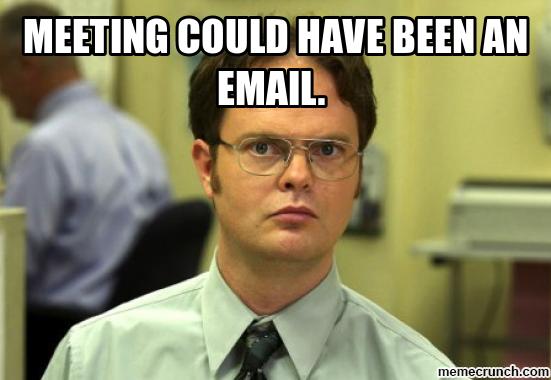SOMEONE I know made a suggestion for a new business the other day and I think he was only half joking.
His pitch was selling life-size cut-outs of people to prop up in their home office chair in front of the laptop to stare, apparently intently, into the camera in any Zoom meeting during which they’d rather be doing something else.
As long as you are wearing the same clothes as the dummy you could in theory begin the meeting full of enthusiasm, hurl in an acceptable share of contributions and then, after disabling the camera and mic, swap in your cardboard doppleganger while you go and watch Netflix in another room.
The potential problem of someone addressing the bogus you during the meeting would be solved after a few minutes of it just staring back in inscrutable silence, when they conclude your connection has frozen.
Obviously in my case the cut-out would be twigged straight away on the tell-tale grounds that it looks more active and engaged than I ever do. But this idea might have some legs (well, it won’t actually have any legs because it’s propped up in your chair, but you know what I mean) because we are all becoming a little Zoom-fatigued.
The novelty of having your work colleagues beamed directly into your home while you sit there in shirt, tie and underpants has well and truly worn off and a recent survey found more than half of people taking part in Zoom meetings are so fed up they would rather doing something else during it.
Take a look at your fellow Zoomers next time you are in a meeting and try to imagine which ones are internet shopping, tweeting, sending other meeting attendants bitchy WhatsApps about fellow workers or even… well, I’ll leave that to your imagination.
But why are they so hard to stay focused on? Research by London South Bank University found that taking part in video calls is mentally exhausting because participants have to work harder to read body language from a one-dimensional, disembodied head than when opposite a real person.
You can’t make eye contact, read the way they are sitting or react to the tone in their voice in the same way. You know immediately in a face to face meeting when someone is annoyed or not themselves in some way, but trying to discern mood from a grainy image the size of a matchbox is as easy as trying to follow the snooker while watching next door’s TV from the bottom of their garden.
Video calls are also horribly formal and regimented. You have to invite someone or be invited and because of time limitations everyone just wants to say what needs to be said and log off. There are few soft edges to the conversation, while the pleasing informality of just bumping into someone by the coffee machine and chatting about nothing in particular is for most people as distant a memory as getting on a train.
Virtual meetings are also the source of anxiety. A London presentation agency surveyed more than 2,000 clients and came up with this list of the ten biggest stress-inducers on Zoom calls.
- Having technical problems and being unable to solve them
- Being unable to read body language
- Feeling like you are not being heard
- Not having time to prepare your appearance before the call
- Worrying about an unprofessional background
- Being talked over when trying to make your points
- Having too many people to focus on
- Worrying about how you look on camera
- Having to manage call screen with presentations and documents
- Not knowing what to do with your hands
Of course the distractions aren’t all mental. Back in those far-off days of face to face, we’d all file into a meeting room or someone’s office, leaving anything capable of distracting us behind.
But at home there’s the phone no one can see you using, that Kit-Kat calling softly to you just beyond the laptop window, the postman at the door with the 14th Amazon delivery of the week or Loose Women on TV. What chance of winning your attention does Darren from accounts have with his report about depreciation deferrals?
But there are ways of overcoming fatigue:
- Set a time limit for meetings
- Suggest a phone call instead
- Think twice about accepting every meeting, could it just be an email?
- Don't be afraid to take a break
- And don't be afraid to say no
One or all of these just might take away some of the life force-sapping drain on your mental resources.
Let's face it, with life far from close to returning to normal for some months yet, the virtual meeting will be with us a long while to come and in many cases may be a permanent fixture.
One day we’ll all be 3-D holograms like in Star Wars but until then we are just going to have to find a way to stay focused.

